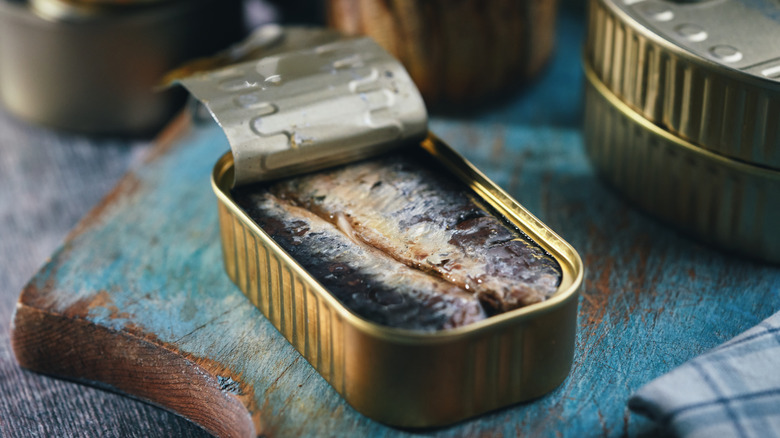Do Canned Sardines Actually Contain Bones?
Tinned seafood is having its moment, introducing more and more options for tasty and accessible marine snacks. A delicious way to improve cooking, it's the sustainable food that's worthy of a corner in the pantry. Of course, to make the most of the product, it's helpful to know what's inside the tin. For example, with small whole fish like sardines, are the bones worth bothering about?
It turns out that you shouldn't fret about a choking hazard. While some canned sardines do contain bones, they're soft and edible. They might not even be discernible when chewed, but they can up the calcium content in the process. Plus, there are skinless and boneless tins available for sale, which alleviate any textural hindrances. So, feel free to try any of the best uses for canned sardines, like pasta and sandwiches, worry-free. And, remember to purchase a reputable sardine brand to make the most out of the small-fish-centric meal.
The bones of canned sardines are highly nutritious
Sardines are an expansive variety of fish. They exist in more than 20 species as well as many tinning flavors, like fish contained in oil, water, and varying spices. Consumed and caught on every inhabited continent, they're a widespread seafood commodity. As a great source of protein, omega-3 fatty acids, calcium, iron, and Vitamin D, you're getting quite a bit from a single tin. If you're looking to get the most nutritional value out of a can, buy the skin-on and bone-in varieties. These will provide the greatest amount of calcium per serving.
The fish's bones aren't naturally edible when fresh. Instead, it's a combination of heat, pressure, and occasionally a brine that softens them to a consumable state. Canned sardine manufacturers purposefully optimize such factors while keeping an eye on flavor to produce results with the best taste and texture. So, explore all the ways to eat sardines and make the most of their tantalizing flavor.

